Paleo protein powder is a special type of protein supplement that’s compatible with the paleo diet.
This means it’s naturally sourced and low in carbohydrates and sugar content, which translates into easier weight loss, retention of lean body mass while dieting, and better maintenance of weight loss after a diet.
Many paleo protein powders are compatible with ketogenic diets thanks to their high protein content and very low carbohydrate content.
Palo protein powders tend not to have artificial flavors and sweeteners as part of their formula, eschewing these ingredients for natural herbal extracts for flavoring and sweetening, if any flavoring or sweetener is present at all.
We’ve reviewed and ranked the ten best paleo protein powders on the market according to quality.
Research
Rankings
1. PaleoPro Protein
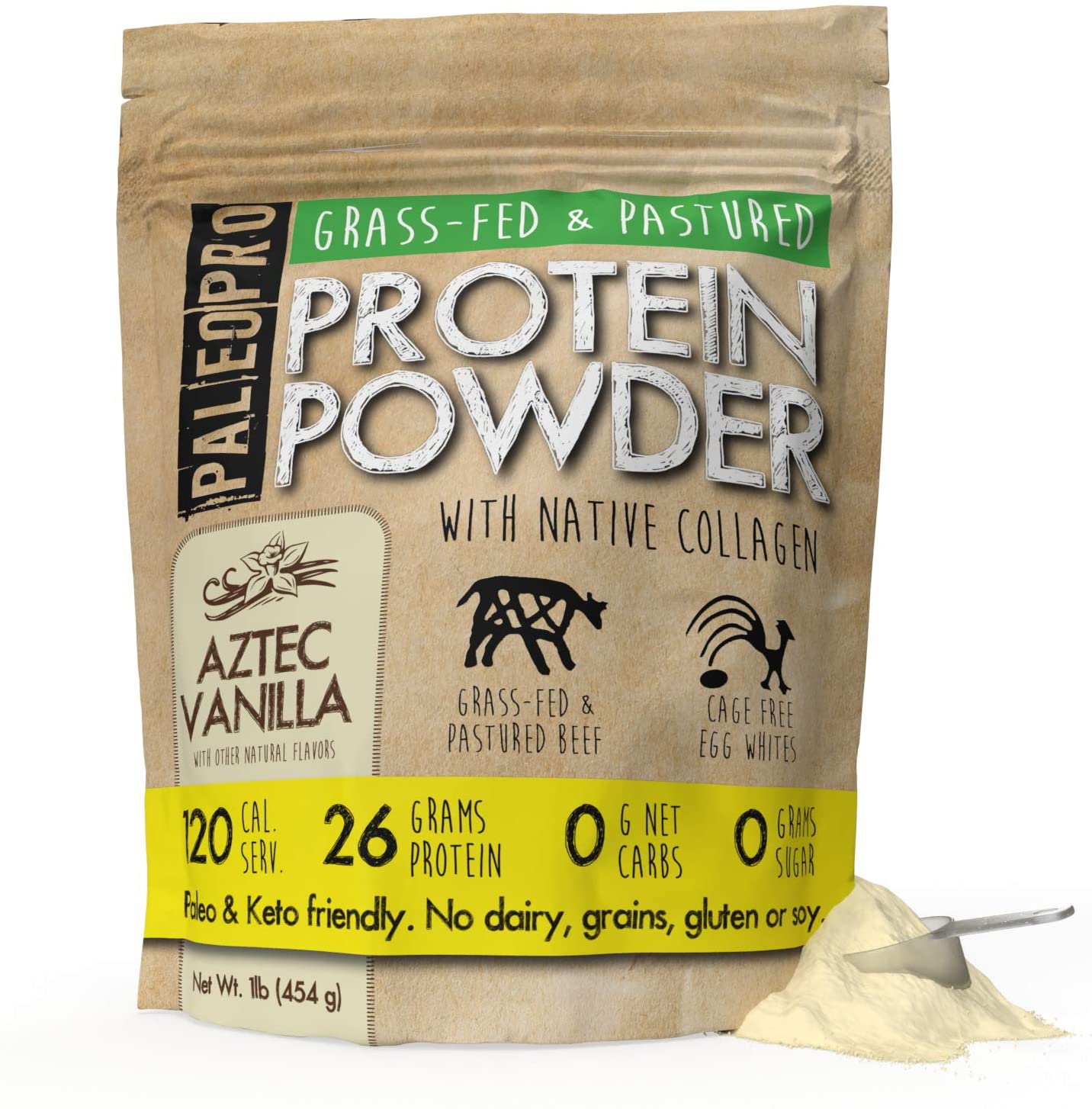
PaleoPro has a super-simple and extremely effective protein powder that’s made up of a blend of beef protein and egg white protein.
With just a touch of natural flavors and monk fruit for flavoring, plus sunflower lecithin for easier blending, this paleo-friendly protein is fantastic if you want to keep to the strictest paleo standards possible: it’s derived only from direct animal products, not from whey.
Thanks to no unnatural ingredients and an extraordinarily high protein content, it’s our top pick.
2. Left Coast Bone Broth Powder
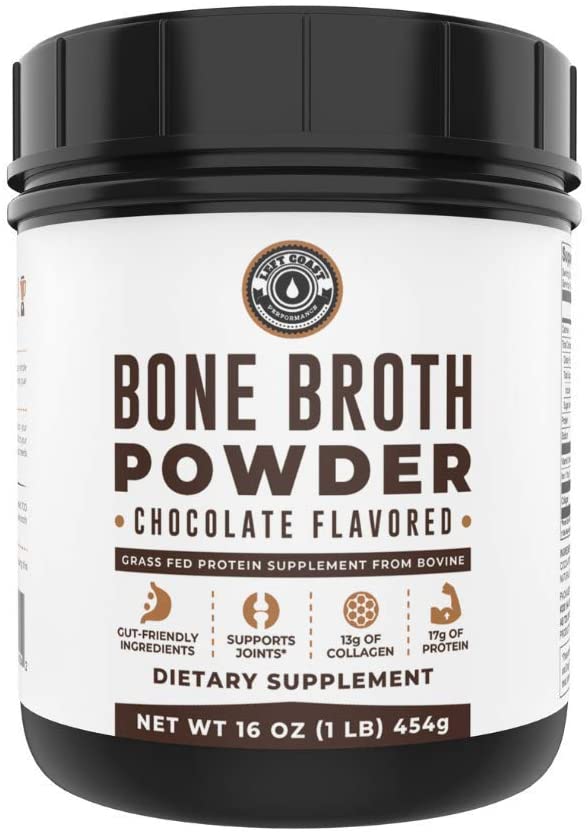
Left Coast makes a simple and paleo-friendly bone broth protein powder that uses all-natural cocoa powder, monk fruit, and stevia for flavoring. It also includes a tiny bit of cane sugar and sugar alcohol (in the form of erythritol), but each of these only amount to one gram per serving. If that doesn’t bother you, it’s the best way to get paleo-friendly beef-derived bone broth.
3. Ancient Nutrition Bone Broth Protein
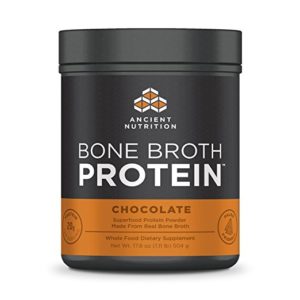
Ancient Nutrition makes a very solid bone broth protein powder supplements that’s unique in its use of chicken broth instead of the more typical beef broth.
It’s flavored with cocoa powder, stevia, and monk fruit extract, and its inclusion of xanthan gum as an emulsifier makes it much easier to blend into a shake or a smoothie. It’s very hard to find any flaws with this paleo protein powder.
4. Amy Myers MD Pure Paleo Protein
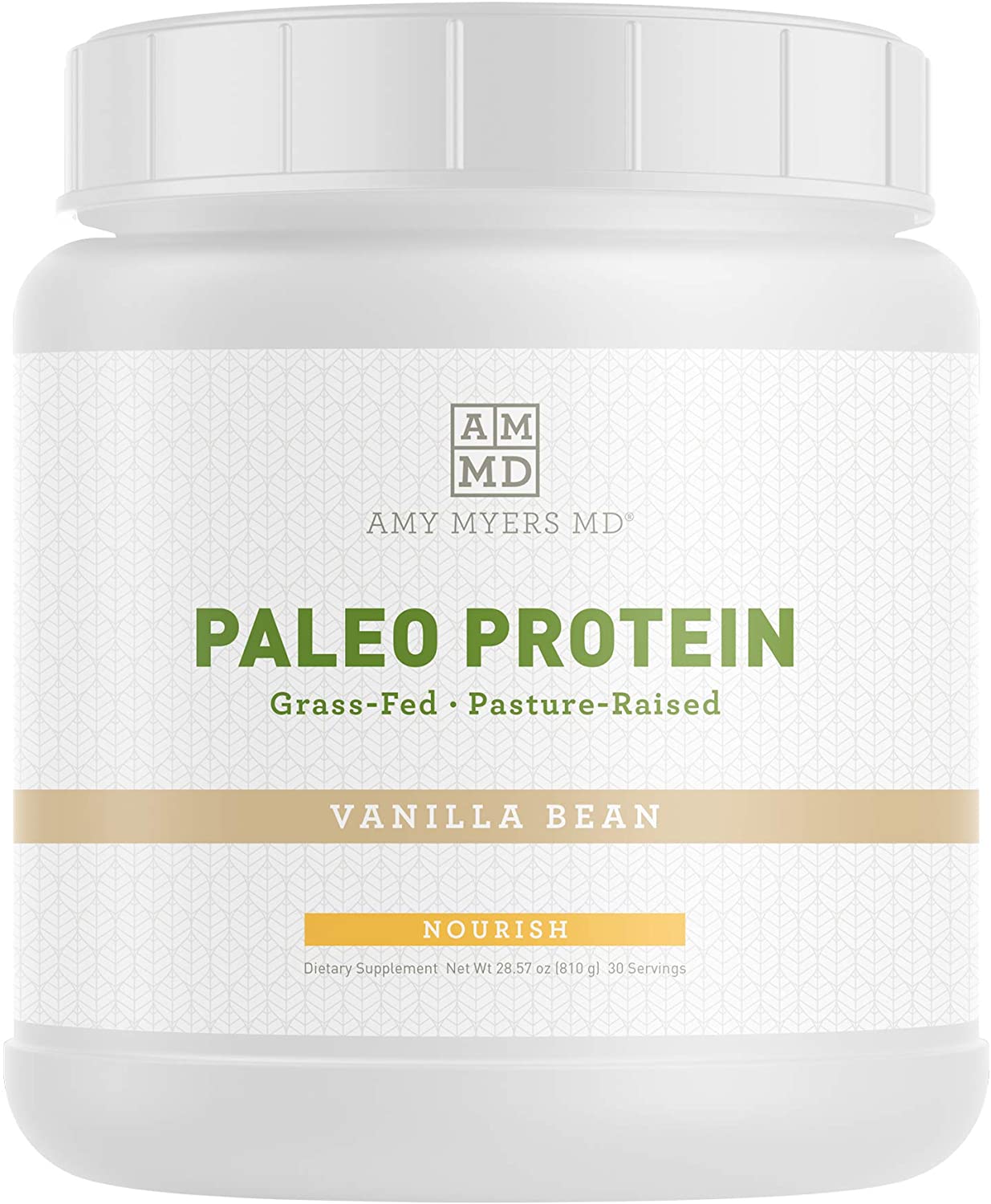
Pure Paleo Protein protein powder relies on hydrolyzed beef protein for amino acids, plus tapioca, stevia, and MCT oil for flavor, blendability, and added fuel for ketosis.
While the lengthier ingredients list might put off some purists, the taste is excellent and it blends up great in protein shakes, smoothies, and meal replacement shakes.
5. Ora So Lean & So Clean
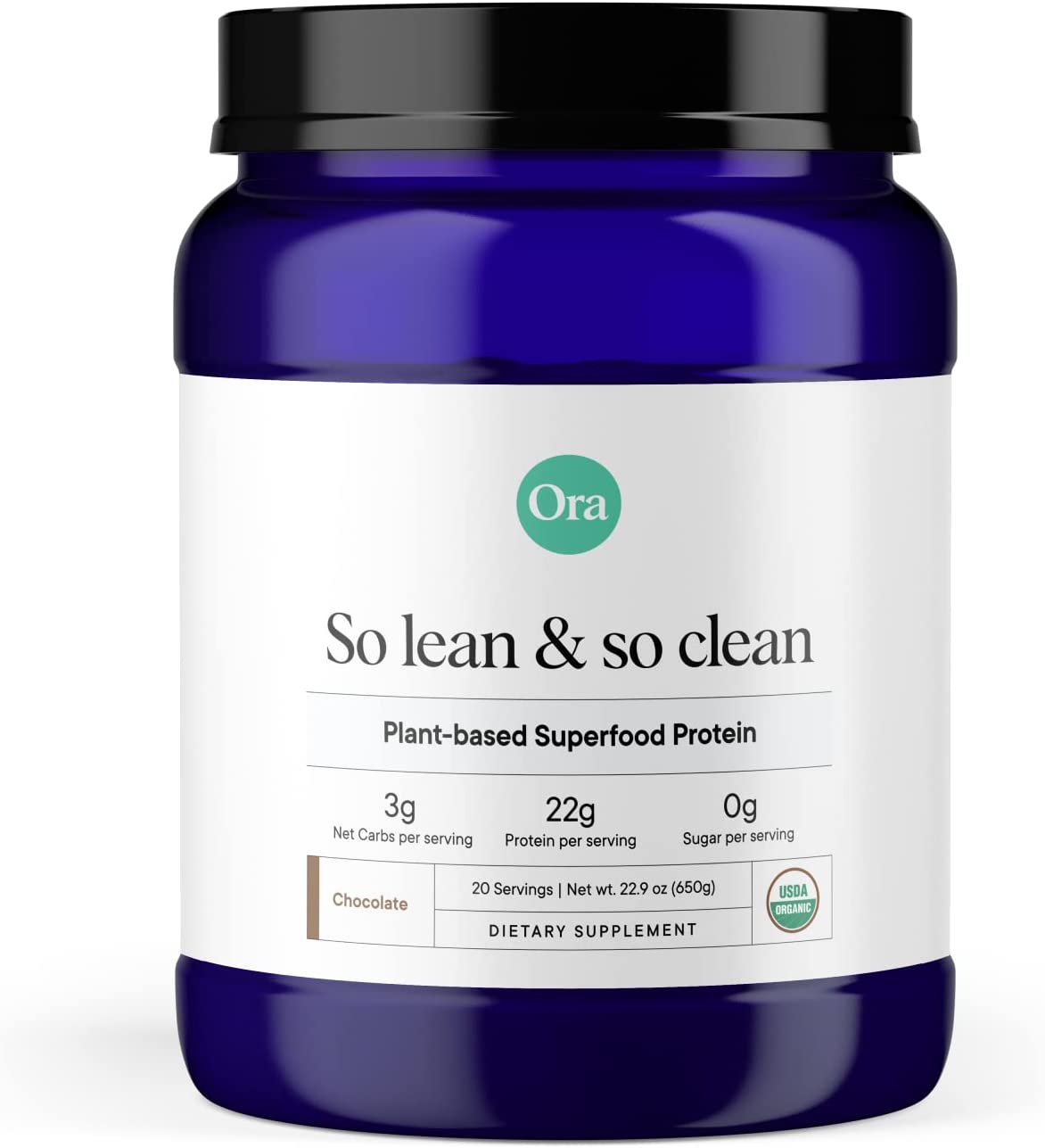
Ora makes a vegan-friendly paleo protein that relies on pea protein and rice protein for its amino acids, but adds in superfoods and greens like cranberry, acai, and broccoli to add in some of the micronutrients that can be hard to get on a paleo-focused vegetarian or vegan diet.
6. Cognitune Bone Broth Protein
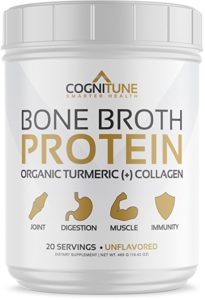
Cognitune offers a clever combination of bone broth protein and turmeric to boost your cognitive function and immunity.
Turmeric is a widely-known “superfood,” and in combination with the protein from bovine bone broth, Cognitude can help you sharpen your thinking as well as your physical performance—particularly if you take it in the morning right after getting up. If you want to incorporate turmeric into your supplementation routine in an easy and seamless way, this is the paleo protein powder for you.
7. Judee’s Dried Egg White Protein Powder
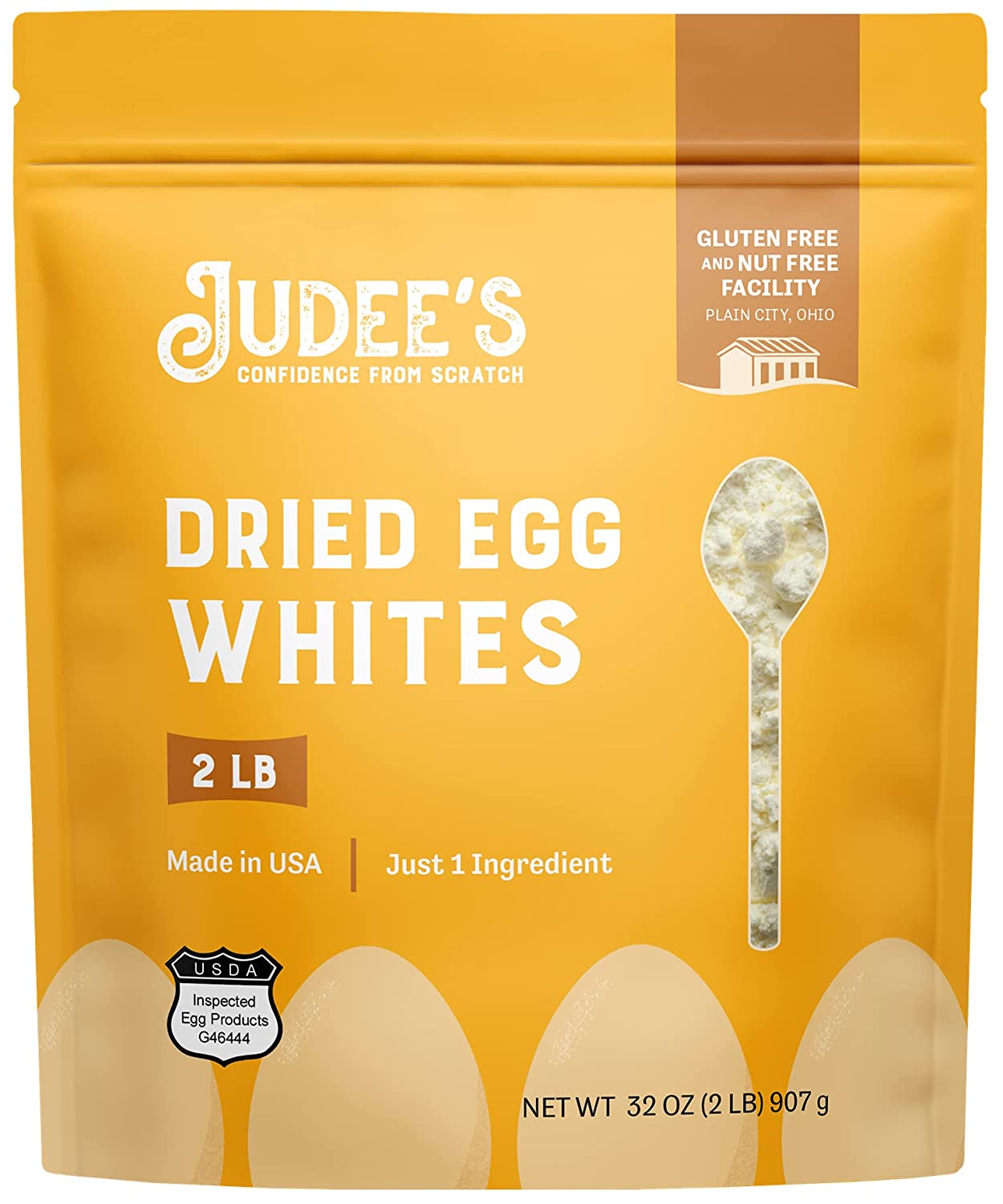
Judee’s makes a giant-sized bulk bag of egg white protein that’s great for mixing into shakes, smoothies, and more.
If egg white protein is just what you need, then this is the paleo protein supplement for you.
8. BulkSupplements Paleo Beef Protein Isolate
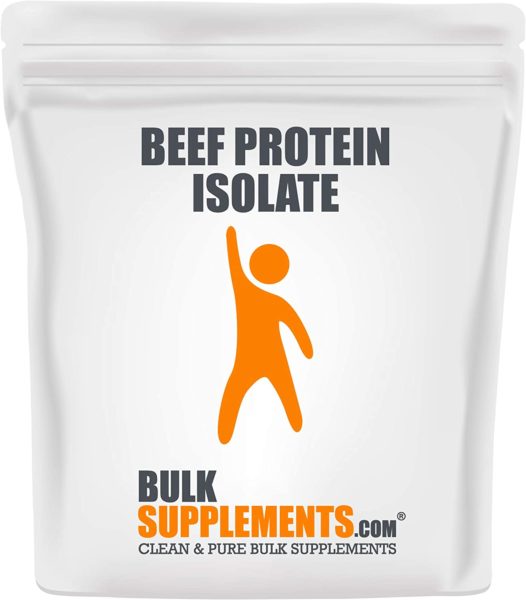
BulkSupplements has a pretty respectable paleo protein powder that’s derived from beef protein isolate, but some other companies have a leg up when it comes to ingredient sourcing and ease of use.
Even so, it’s not a bad pick if a paleo-friendly protein isolate is all you need.
9. Perfect Keto Protein Powder
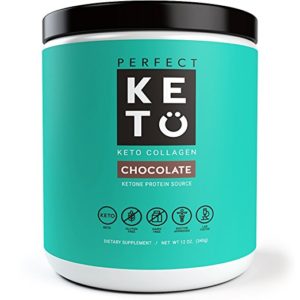
Perfect Keto is a good choice for people who go paleo in order to maintain a ketogenic diet. Its inclusion of MCT oil along with hydrolyzed protein means that it provides a lot of fat for fuel.
The downside, and the turnoff for many people who are not on a keto diet, is that the MCT oil dilutes the protein content—this protein powder is only about two-thirds protein by weight.
10. Primal Kitchen Primal Fuel
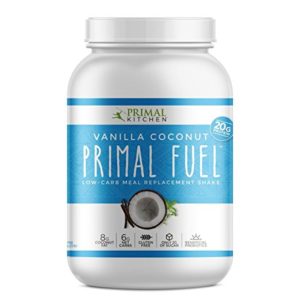
Primal Kitchen Primal Fuel, though billed as a paleo-friendly protein powder, doesn’t quite measure up compared to a lot of other options on the market. Why? First, some hardcore paleo purists would object to using whey protein as the base of this supplement.
Whey protein is derived from dairy, which some do not see as “truly” a paleo food. Second, this protein powder doesn’t work well with keto or low-carb diets.
It uses coconut milk as a natural flavoring agent, which is fine, but the sugar in the coconut milk pushes carbohydrate content up to nine grams of carbohydrate per serving. That’s high enough to rule this out for a low carb or keto diet, in all likelihood.
Category winners
Best paleo protein overall: PaleoPro Protein
PaleoPro provides an excellent combo of beef protein isolate and egg white protein for a clean, balanced amino acid profile. On top of that, it’s flavored exclusively with all-natural monk fruit and cocoa powder, which adds precisely zero to the carb count. The excellent design makes it an easy pick for the number one spot.
Best paleo protein for meal replacement shakes: Amy Myers MD Pure Paleo Protein
Amy Myers MD makes a great paleo-friendly protein powder that is a great choice for meal replacement shakes thanks to its inclusion of tapioca and MCT oil, which add to the fat content, improve the taste, and most importantly, make it much easier to blend up without clumps.
Best paleo protein for the keto diet: PaleoPro Protein
PaleoPro’s focus on providing a great-tasting paleo-friendly protein with zero added carbs makes it a great option for the keto diet. The amino acid profile is great and you don’t have to worry about bloating your macros with unnecessary carbs either.
Best paleo protein for vegetarians: Ora So Lean & So Clean
Paleo-friendly protein powders for vegetarians and vegans are hard to come by, but Ora is a great option if you want to opt for animal-free paleo protein. Using two different sources of plant protein gives it a complete amino acid profile, and it doesn’t rely on sugar for added sweetness either.
Best paleo protein for weight loss: PaleoPro Protein
Many of the advantages that gave PaleoPro Protein our top overall spot also make it a great choice for weight loss: it uses high-quality sources of protein, and on top of that it’s flavored only with non-caloric, naturally-sourced sweeteners like monk fruit.
Best paleo protein with collagen: Left Coast Bone Broth Protein
If you want to get some collagen (a compound that’s helpful for joint and connective tissue health) alongside the protein in your paleo protein powder, you want a bone-broth-based source of protein. Left Coast Bone Broth Protein is our favorite on this front, thanks to its use of grass-fed beef as its source of bone broth. This ensures high-quality protein that contains ample amounts of both Type I and Type III collagen.
Who should buy paleo protein powder?
Paleo protein powder is great for all individuals looking to lose weight and be healthy. It can also help improve muscle tone, recovery, and athletic performance.
Paleo protein powder shines as it contains no common allergens or sugar, making it perfect for those who follow restrictive diets such as the paleo or keto diet. It may also be appropriate for people with dairy allergies or those avoiding specific animal products.
Children shouldn’t need to consume paleo protein powder unless specified by a health professional. Diabetics and other special populations such as pregnant women can consume paleo protein powder but should proceed cautiously due to the lack of long-term research surrounding the safety in these populations.
Protein powder, in general, doesn’t interact negatively with most medications, and since paleo protein is even purer, it has an even safer track record. That being said, it’s always best to speak to your doctor before taking any paleo protein powder supplement.
How we ranked
One of the most important factors to analyze, when formulating the list for the best paleo protein powders on the market, was the source and type of protein. Because dairy is considered off-limits during the paleo diet, we did not include any pure whey proteins high on our list. The exception was Primal Kitchen, as they are more of an athletic paleo brand that allows for small bouts of dairy. While vegan proteins are better, their general lack of complete amino acid profiles deterred us from including them in our rankings.
Based on the above, it left us with three options: egg protein powder, beef protein powder, and bone broth protein powder. All 3 are good options and made the list based on different criteria. Bone broth proteins, like Necessity Nutrition that ranked highly, were because they were slouched from grass-fed cows. This helped to limit the transfer of antibiotics and hormones from the cows to you, the consumer. We also found that these types of proteins limited bloating for the most part, which is why they are so popular on our list.
Egg proteins tend to digest very slowly, whereas beef protein tends to provide amino acids a lot faster. As such, we preferred protein blends of the two, like PaleoPro, which took the top spot.
Lastly, we looked at the flavoring. Any product with added sugars or artificial sweeteners, fillers, or additives was immediately axed as it violated the fundamental rule of paleo protein: purity. Products that used natural sweeteners like Ancient Nutrition were rewarded and ranked highly on our list.
Benefits
Paleo protein powder can help you lose fat and spare muscle. Research has found that taking a protein supplement during the course of a weight loss program has two parallel and useful effects: first, it increases the amount of fat mass you lose, and second, it helps you preserve muscle mass while losing weight.
This was the conclusion of a study published in 2008 by Joy Frested and other researchers (1). In the study, 158 obese volunteers were given either a protein supplement or a placebo supplement with an equal amount of calories as part of a 12 week weight loss program.
After the conclusion of the study, the researchers found that the protein supplement resulted in greater amounts of body fat lost, and a smaller amount of muscle mass lost, compared to the group that received the placebo.
The authors surmised that the increased protein intake in the diet provided by the protein supplement shifted the body’s weight loss priorities from muscle to fat.
Paleo protein powder can help you maintain weight loss. One of the most attractive features of a paleo protein supplement that’s high in protein and low in carbs, sugar, and additives is that it not only helps you lose weight, but keep the weight off as well.
One study that demonstrated this effect was a 2005 paper in the British Journal of Nutrition that investigated the effects of adding 30 grams of protein intake per day to the six-month period following a weight loss program in a group of overweight subjects (2).
This was compared to a control intervention that had no alteration in their post-weight loss food plan. The researchers found that the protein group regained an average of less than two pounds during the six-month weight maintenance phase, while the control group regained almost seven pounds.
Greater protein intake limits hunger and prevents gaining body fat. Another study published in the International Journal of Obesity took a closer look at how adding protein to your diet can help after a period of weight loss (3).
This study took a group of overweight and obese subjects who had followed a low-calorie diet for four weeks and were starting a three-month weight loss maintenance program.
Half the subjects received 50 grams of supplemental protein every day, while the other half followed a standard post-weight loss dietary plan.
The researchers found that, at the conclusion of the study, the subjects who had received the supplemental protein in their diet had regained, on average, 50% less weight than the people who received the standard post-weight loss dietary intervention.
The researchers connected this with protein’s ability to lower your levels of hunger, increase your sense of fullness, and shifting weight regain from fat to muscle. This last point is well worth considering, because if you are gaining muscle mass after a weight loss program, that’s not a bad thing—gaining fat mass is the problem.
Side effects
Like with other protein powders, paleo protein powder is extraordinarily safe—because it’s derived directly from healthy foods like beef, chicken, and eggs, there are side effects of note.
The only exception would be in the very rare case of someone who is both allergic to eggs and chooses an egg white based paleo protein powder.
This is an easy problem to avoid, though; there are plenty of great paleo protein powders that use beef or chicken as their base material.
The only group of people for whom paleo protein does not offer many options are vegans, but in this case, there are plenty of great vegan protein powders that are plant-based that you can check out.
Recommended dosage
The optimal dose of paleo protein powder is going to depend on whether you are using it primarily for athletic endeavors or for weight loss and weight maintenance.
The latest guidelines for protein intake for athletes is as follows: 1.2 to 1.4 grams of protein per kilogram of body mass per day if you are training for endurance events, and 1.4 to 1.8 grams of protein per kilogram of body mass per day if you are training for strength, speed, and power events, according to a review article in the International Journal of Sports Nutrition (4).
If you are really looking to put on muscle, it may be desirable to aim for slightly higher protein intake, more on the order of 2.5 grams of protein per kilogram of body mass per day.
For weight loss and weight loss maintenance, recommended intakes are in the range of 30 to 50 grams of protein per day. Note that this is raw protein, not grams of protein powder. Paleo protein powders are often over 90% protein by weight, so the numbers are pretty close, but that’s not always the case.
In terms of when to take a protein supplement for weight loss and weight loss maintenance, it is best to take your paleo protein supplement in the morning and at some point in the afternoon or early evening before dinner.
Taking protein in the morning jump-starts your body in the morning, and the hunger-suppressing effects of paleo protein will help keep your caloric intake low at breakfast, lunch and dinner if you follow these dosing recommendations.
FAQ
What are the advantages of keeping protein powder paleo-friendly? Protein powder by itself helps a lot with athletic performance, improving your strength, losing weight, and maintaining a lean and athletic physique.
The low carb and low sugar composition of paleo-friendly protein powders gives them a distinct advantage for anyone who cares about body composition, whether you are an athlete or just someone looking to drop some body fat.
Can I take Paleo Protein Powder if I am on other medications? There is no significant evidence to show that a plant-based protein powder would interact with the medications you are taking. You should be consulting your doctor before you add a supplement to your diet.
Can I take paleo protein powder if I am taking other supplements? There is no significant evidence to show that a plant-based protein powder would interact with supplements you are taking. You should be consulting your doctor before you add a supplement to your diet. If you are already taking a protein supplement, you may want to reconsider, as taking too much protein just gets expelled from the body and has no real benefit.
Is paleo protein powder suitable for children? Typically, children should be receiving enough nutrients from their diet, meaning that a paleo protein powder supplement should not be necessary unless otherwise specified by their doctor. They also need less protein daily than a full-sized adult.
Is paleo protein powder good for you? Yes, as long as you are choosing a product that is trans fat or partially hydrogenated oils free, around 200 calories or less, has 5 grams of sugar or less, and has 2 grams of saturated fat or less. A paleo protein powder should not be a replacement for a balanced and healthy diet, and protein should be consumed with fruit, vegetables, and whole grains.
Can paleo protein powder help me lose or gain weight? Protein is an essential nutrient for both weight loss and putting on muscle. Protein powder shakes can help curb hunger, boost your metabolism, and help you lose weight. They can also help nourish your muscles if you are trying to put on weight through exercise. However, total caloric intake will be the main driver of weight gain and weight loss.
Is whey protein powder considered paleo friendly? Paleo-friendly protein powders are typically plant or egg-based. Whey protein powder is derived from milk, so it does not meet the Paleo diet’s standards, as dairy is not consumed on this diet. That being said, one of the biggest paleo companies, Primal Kitchen, has a protein powder with whey claiming that it’s clean enough to be considered Paleo-friendly.
What is the best brand of paleo protein powder? There are several different kinds of paleo protein powder, including powders derived from egg whites, peas, soy, hemp, and brown rice. Choosing which one is best for you will be a personal preference based on ingredients and taste. Doing research and reading forums can help you make an informed decision, as well as talking to your doctor.
Some of the most popular on the market include Orgain Organic Plant-Based Protein Powder, Creamy Chocolate Fudge, and Garden Of Life Sport Organic Plant-Based Protein.
What happens if I take too much paleo protein powder? If you are consistently taking too much of a protein supplement or consuming way too much protein in your diet, you may experience some discomfort. If you take too much protein, you could experience dehydration, feel exhausted, have nausea, have indigestion or diarrhea, have a headache, or feel irritable.
If you chronically consume too much protein, you could start experiencing seizures, liver and kidney issues, blood vessel disorders, cardiovascular disease, or even cause death. You may be at risk of developing certain cancers, type 2 diabetes, or osteoporosis if you continue to over-consume chronically. A dietician can help you determine how much protein you need based on your goals.
What happens if I’m allergic to paleo protein powder? Allergic reaction to paleo protein powder is rare due to the plant-based or egg-based nature of the ingredients, but if you are allergic, you may experience dizziness, nausea, swelling of the mouth and tongue, difficulty breathing, or develop a rash or hives.
There are many different types of plant-based protein powders, so it’s crucial to read all the ingredients before ingesting. If you are experiencing any of these issues, please seek immediate medical attention.
Is it okay to use paleo protein powder in cooking? There are many fantastic recipes that include paleo protein powder. As long as you aren’t adding additional protein sources or over-consuming, this is fine.
Can I have paleo protein powder if I am lactose intolerant? Since paleo protein powders are typically plant-based, vegan, or egg-based, a lactose intolerant person should be able to consume without issues.
How much paleo protein powder can I have on a daily basis? Each person’s protein needs are different. It’s suggested that 10 to 35 percent of your daily calorie intake should be from protein, and the RDA for adults is 0.8 grams of protein per kilogram of body weight.
Those who are active, and as we age, we require between 1 to 1.7 grams of protein per kilogram of body weight. For example, someone who weighs 165lbs would aim to consume about 60 grams of protein per day. Using a paleo protein powder supplement to reach the recommended amount of protein is helpful, but if you are exceeding 2 grams of protein per kilogram, you are over-consuming.
How does paleo protein powder improve my time in the gym? Protein Powder of any kind works to aid in recovery after a workout and provide nutrients to facilitate muscle growth. If you are exercising vigorously, your protein needs will be more than a sedentary individual. Plant-based protein powder can help your body recover and reap the benefits from your workouts.
Is paleo protein powder suitable for pregnant or breastfeeding women? Protein requirements are a bit higher for pregnant women, so a supplement may be suitable if she is struggling to meet her needs through diet alone. Please consult your doctor for which supplements are suitable for pregnancy or breastfeeding before consuming.
How much water should I mix into my paleo protein powder? Each brand of powder will have different instructions on how to use the product, so please always read and follow the label of any supplement you choose to take. You can also add more water or use less water based on your personal preference.
When should I take paleo protein powder? Protein consumption should be spread out gradually throughout your meals because the body can only absorb so much protein at one time while expelling the rest through urine. When you consume most of your daily protein through meals with other foods, you are getting the most out of the nutrient.
Taking a supplement is recommended 45 minutes to one hour after a workout. Taking a higher dose is not more effective than 15 to 25 grams at once, so be mindful of how much you’re consuming.
What does paleo protein powder taste like? Each product on the market is going to do it’s best to be as palatable as possible. Plant-based protein powders will taste like any other protein powder available. Most brands will have chocolate, vanilla, and strawberry flavors available, and might include some specialty flavors.
The better it tastes, the better people will enjoy using it, and the better it will sell. Most health food stores will be able to provide samples for you to test if you want to find a protein powder that tastes great before purchasing. Those who work at those stores will be able to recommend a flavor or let you know their best selling products.
Can I use paleo protein powder as a meal replacement? Protein powders and shakes are not intended to replace meals. Protein should be consumed with fresh fruits, vegetables, and whole grains as part of a balanced diet.
Protein powder is a supplement, so it should be supplementing your diet after a workout or if you are unable to meet your protein needs through diet alone. Taking a protein powder instead of a meal will not be satisfying and can lead to binge eating.
How do I know which paleo protein powder is right for me? Each individual is different and will require different protein needs. Paleo protein powder can be derived from many various sources, so choose one that appeals to you. You want to choose a product that has zero trans fat, zero hydrogenated oils, less than 200 calories per serving, less than 5 grams of sugar per serving, and has less than 2 grams of fat per serving.
Does paleo protein powder go bad? Typically, protein powders will come with a best before date or expiry date, but since it’s a dry substance, there is a low risk of bacterial growth, causing the powder to go bad. If your protein powder is unopened, it may be safe to use after the best before date.
If your powder has been opened, it may be safe to consume for about six to eight months after the best before date. Still, it’s suggested that protein starts to lose its effectiveness after that best before date, so it would be best to replace the product after expiry to be on the safe side.
Related articles
- Low carb protein powder
- Protein shakes
- Best tasting protein powder
- Keto protein powder
- Whey protein powder
- Casein protein
Recap
Paleo protein powder, with its low carbohydrate content and extremely high protein content, is an excellent way to build muscle, lose body fat, and keep off the weight you’ve worked hard to lose.
Paleo protein powder keeps you from getting hungry, and it’s useful for both serious athletes and regular people looking to get healthier and improve their body composition.
For weight loss and weight maintenance, between 30 and 50 grams of protein per day seems to be the right dosage, while for athletes, recommendations are based on your body mass.
Regardless of whether you’re using it for performance or health, paleo protein powder is a valuable addition to your diet.
For BodyNutrition’s #1 recommended paleo protein powder, click here.